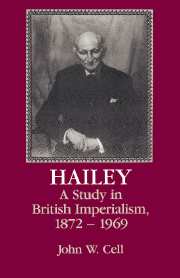Book contents
- Frontmatter
- Contents
- List of abbreviations
- Glossary of foreign words
- Preface
- 1 Early life
- 2 Colonization officer, 1901–1906
- 3 From Sargodha to Delhi, 1907–1912
- 4 Chief commissioner of Delhi, 1912–1918
- 5 A report on the Punjab
- 6 Finance member, 1919–1922
- 7 Home member, 1922–1924
- 8 Governor of the Punjab: the Sikhs, 1924–1925
- 9 Governor of the Punjab: the communal problem, 1924–1926
- 10 Governor of the Punjab: the communal problem, 1927–1928
- 11 Governor of the United Provinces, 1928–1930
- 12 Governor of the United Provinces: civil disobedience and Round Table Conference, 1930–1931
- 13 Governor of the United Provinces: 1931, year of crisis
- 14 Governor of the United Provinces: winding down, 1932–1934
- 15 Surveyor of Africa, 1935–1939
- 16 Two missions to Africa, 1939–1940
- 17 A report and a vision, 1941–1942
- 18 Adviser and propagandist, 1942–1945
- 19 Indian partition and the onset of African decolonization, 1945–1949
- 20 Defender of the faith, 1949–1969
- Bibliography
- Index
14 - Governor of the United Provinces: winding down, 1932–1934
Published online by Cambridge University Press: 12 October 2009
- Frontmatter
- Contents
- List of abbreviations
- Glossary of foreign words
- Preface
- 1 Early life
- 2 Colonization officer, 1901–1906
- 3 From Sargodha to Delhi, 1907–1912
- 4 Chief commissioner of Delhi, 1912–1918
- 5 A report on the Punjab
- 6 Finance member, 1919–1922
- 7 Home member, 1922–1924
- 8 Governor of the Punjab: the Sikhs, 1924–1925
- 9 Governor of the Punjab: the communal problem, 1924–1926
- 10 Governor of the Punjab: the communal problem, 1927–1928
- 11 Governor of the United Provinces, 1928–1930
- 12 Governor of the United Provinces: civil disobedience and Round Table Conference, 1930–1931
- 13 Governor of the United Provinces: 1931, year of crisis
- 14 Governor of the United Provinces: winding down, 1932–1934
- 15 Surveyor of Africa, 1935–1939
- 16 Two missions to Africa, 1939–1940
- 17 A report and a vision, 1941–1942
- 18 Adviser and propagandist, 1942–1945
- 19 Indian partition and the onset of African decolonization, 1945–1949
- 20 Defender of the faith, 1949–1969
- Bibliography
- Index
Summary
At an Indian Civil Service dinner in Lucknow in February 1932 Hailey spoke of trying times just past and still more difficult ones ahead. Although he noted that the current civil-disobedience campaign was being contained successfully, within two or three years the new constitution would bring provincial autonomy and an extension of popular institutions. By then either a strong and responsible conservative party dedicated to maintaining the British connection would have been constructed or power would have to be handed over to a Congress controlled by its left wing. If Providence decreed the second alternative, then he hoped England would recognize that the work of their great and noble service was finished: “It must march out with the honours of war, with its flag still flying. … If that be the manner of our ending, then it will be no unfitting end.” Such a defeatist outlook was all very well for famous old men at the end of their careers, one of his audience grumbled later.
Compared with 1930, Hailey judged, 1932 was a damp squib. The difference in government policy must be stressed, for whereas in 1930 repression had built up gradually, now the mailed fist struck hard from the first. As Gandhi wrote in despair, the array of special ordinances made it virtually impossible to sustain the sort of popular, open, quasi-legal, nonviolent movement Congress represented.
- Type
- Chapter
- Information
- HaileyA Study in British Imperialism, 1872–1969, pp. 199 - 214Publisher: Cambridge University PressPrint publication year: 1992



